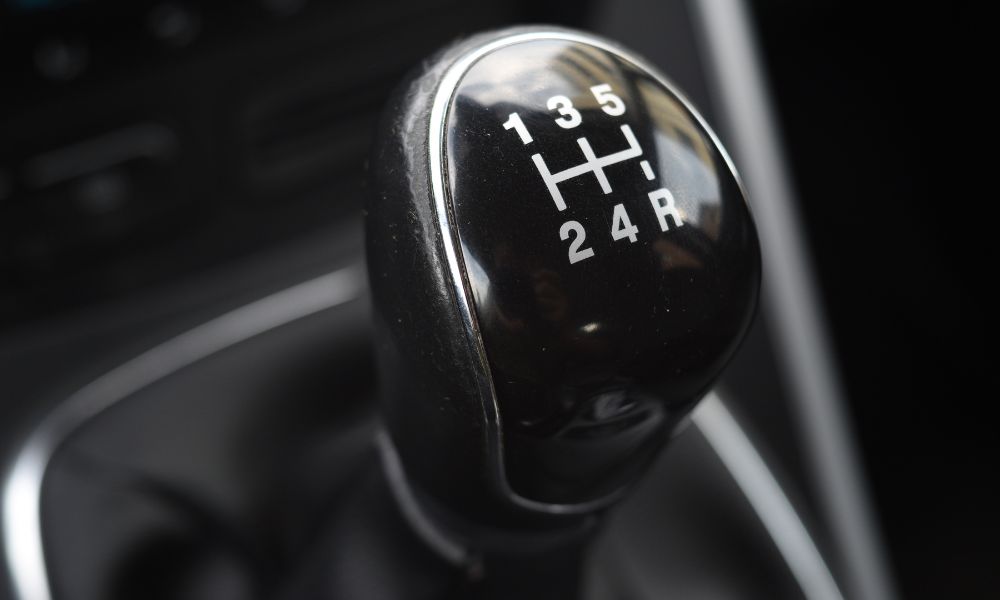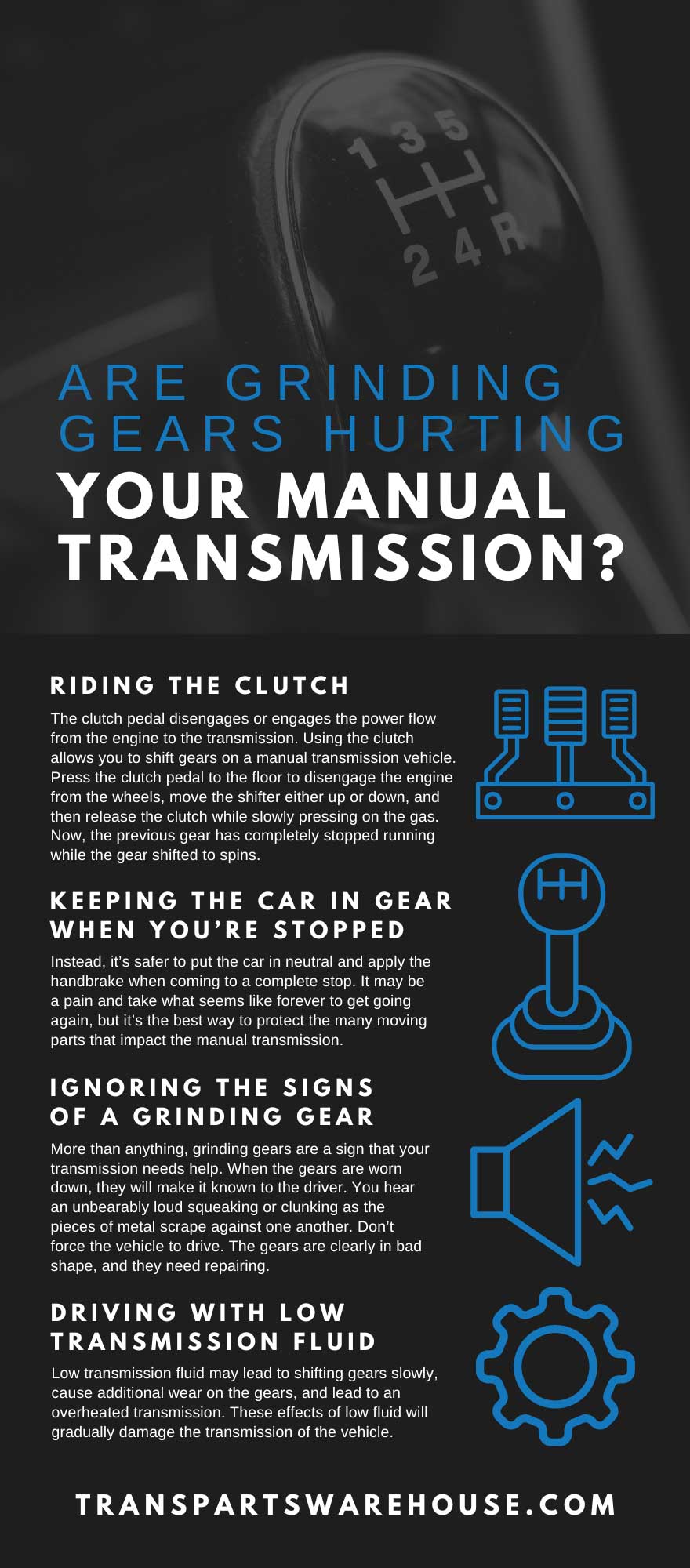
People who adore cars are always ready to protect and repair their vehicles. When it comes to their manual transmission vehicle, sometimes it needs a little extra love than the average automatic car.
You start to notice something isn’t running quite right. You hear a screeching sound coming from the engine. It’s a clear sign that something is wrong with the gears, but what’s truly causing the gears and the transmission to malfunction? Are the two directly related?
Continue reading to learn more about if grinding gears are hurting your manual transmission!
Reasons Why Gears Grind
The grinding sound is a clear indication that something’s wrong with the vehicle. The first step to understanding if grinding gears are the cause of a malfunctioning transmission is to first learn about some of the reasons why gears grind.
Worn-Down Teeth
A gear in good shape will have pointed teeth and a coating on the surface. It takes a lot of time and driving to completely round out the teeth and remove the coating, but it’s possible. There’s a slider that locks into place over the gear, and the points of the gear guide the slider quickly to shift gears.
The sharp points make it easy to shift, but when the teeth are rounded and worn down, this is where things get difficult for your vehicle. Sometimes, the gears will grind so badly that your car cannot shift into gears. The more you grind it, the more likely you’ll have trouble getting the gears to go on and off when manually shifting.
When there’s an issue with the gears, you feel the vehicle shaking and rumbling when shifting until it gets up to speed. The transmission is supposed to shift smoothly. The shaky sensation is a sign that the gears are shot and are impacting the overall function of the vehicle’s transmission.
Manual Transmission Synchronizer
Another problem that may affect the gears is the synchronizer. It adjusts the speed of the shaft so the gears will align at a quicker speed while you’re shifting.
When the synchronizer is damaged, you’ll hear either a humming or grinding sound. This is due to the synchronizer faltering because the rings aren’t attaching to the gears at a quick enough rate. Also, there might not be enough friction on the metals for the gear and the synchronizer to attach.
Insufficient Lubricant
Gears are put to the test when driving any vehicle, but especially when driving a stick shift. When there’s not enough lubricant present, the metals will rub together in high-temperature conditions.
This is dangerous for the vehicle and your safety. Insufficient lubrication can cause the teeth of the gears to wear down and potentially overheat the engine.
The Most Common Ways You Can Damage the Manual Transmission
It will take an immense amount of damage for the gears to succumb to damage on their own. Most of the time, the gears aren’t the sole cause of a manual transmission’s downfall. In fact, it’s more commonly another culprit causing grinding gears that impact the quality of the transmission.
Here’s a quick rundown of some of the things you want to avoid in order to keep your manual transmission running properly.
Riding the Clutch
The clutch pedal disengages or engages the power flow from the engine to the transmission. Using the clutch allows you to shift gears on a manual transmission vehicle. Press the clutch pedal to the floor to disengage the engine from the wheels, move the shifter either up or down, and then release the clutch while slowly pressing on the gas. Now, the previous gear has completely stopped running while the gear shifted to spins.
Riding the clutch is when you leave your foot on the pedal and apply pressure instead of completely disengaging the clutch. It’s easy to do this when you’re in slow-moving traffic or sitting in an uncomfortable driving position—but it’s a habit you must break.
Constantly riding the clutch will cause excessive wear to the gears. This frequent additional pressure causes the gears to wear out more quickly. You’re also more at risk for clutch slipping, which causes strain on the engine while still being able to rev the engine despite poor acceleration.
Overall, riding the clutch frequently each time you drive a stick shift will put excessive stress on the clutch, gears, and transmission.
Keeping the Car in Gear When You’re Stopped
You’re ready to take off at a stop sign, so you keep the vehicle in first gear so you can easily accelerate. As mentioned above, riding the clutch puts additional strain on the clutch and transmission over time.
Instead, it’s safer to put the car in neutral and apply the handbrake when coming to a complete stop. It may be a pain and take what seems like forever to get going again, but it’s the best way to protect the many moving parts that impact the manual transmission.
Ignoring the Signs of a Grinding Gear
More than anything, grinding gears are a sign that your transmission needs help. When the gears are worn down, they will make it known to the driver. You hear an unbearably loud squeaking or clunking as the pieces of metal scrape against one another. Don’t force the vehicle to drive. The gears are clearly in bad shape, and they need repairing.
To prevent your gears from getting any worse or impacting the transmission, wait to drive the vehicle again until it’s been fixed. You’ll minimize the risk of further damaging the vehicle and possibly needing a transmission repair.
Driving With Low Transmission Fluid
Driving with low transmission fluid is dangerous for the vehicle and your safety. Metals need proper lubrication to avoid grinding and run smoothly.
Low transmission fluid may lead to shifting gears slowly, cause additional wear on the gears, and lead to an overheated transmission. These effects of low fluid will gradually damage the transmission of the vehicle.
Check the transmission fluid about once every month. Inspect the fluid to ensure it’s not contaminated or too low. Stick with this preventative measure to keep your car running safely and smoothly.
The bottom line is that grinding gears can hurt your car’s manual transmission, but the issue typically doesn’t start with the gears. User errors and malfunctioning parts are most likely the reasons gears start grinding. When you’re in need of a repair, Transparts Warehouse has a variety of manual transmission replacement parts to revive your vehicle’s transmission!



